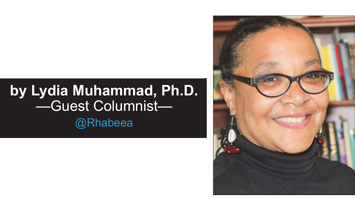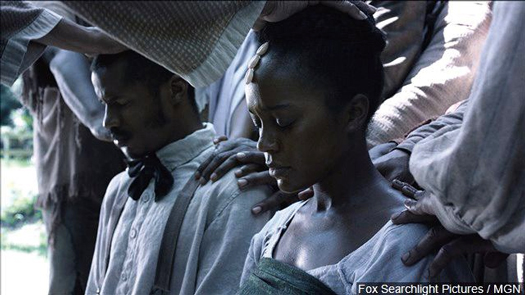The Birth Of A Nation 2016: A Different Black Woman’s Take
By Lydia Muhammad, Ph.D. -Guest Columnist- | Last updated: Oct 28, 2016 - 9:27:08 AMWhat's your opinion on this article?
On October 7, 2016, Nate Parker’s independently produced film The Birth of a Nation was released. The release, much anticipated since its award winning reception at the Sundance Film Festival, was preceded however, by vitriol which was not only unprecedented but more importantly undeserved.

|
Following the peculiarly timed release of information about Mr. Parker’s acquittal of nearly 20 years ago of rape charges, commentary was set ablaze by an opinion piece in The Nation magazine. Authored by Dr. Leslie M. Alexander, professor of History and African American Studies at The Ohio State University, the piece ignited discussions about abusive treatment of women and fostered boycotts of the film.
My rebuttal is based on my own visceral feelings of positivity, awe, and sorrow evoked by the film, by a thorough and close reading of Alexander’s opinion piece, and by a clarifying conversation with a Black female scholar with whom I am frequently on opposite sides of commentary on popular culture ... but with whom I can remain friends. And being able to disagree without being disagreeable is one of the heart tugging reactions I had to the overkill of hater commentary which flooded social media; to say nothing of mainstream media commentaries.

Marriage ceremony scene from “Birth of a Nation 2016”. Photo: MGN Online
|
Alexander is a self-described “professional historian” of the Black experience in the 19th century and a teacher of historical accuracy in film. And true to her bonafides, undergirding her argument that the film is an “epic fail” is her interpretation of Parker’s failed allegiance to historical “fidelity.” Alexander charges that the film is rife with discrepancies, omissions, and downright inaccuracies. On these points, she dismisses the film as not useful. I’ll leave the question of who authored the histories she references for another time.
It is her “outrage about violence against women” in the film that stoked the fires of a type of feminist argument. Alexander asserts that the brutal assault on Nat Turner’s wife was the single spark that drove him to avenging acts of violence. After her article appeared, some went as far to say that Parker shouldn’t have included the rape attributions at all. For as a rapist—the haters believe that he is/was guilty, regardless of the outcome of the judicial process— he cannot/should not include such content in his art. This aspect of the argument seems to be that Parker—even nearly two decades later—doesn’t possess the moral gravitas to make any depictions of violence against women.
What I don’t get is how the film becomes a litmus test for Parker’s personal behavior in the past. Black men were not perpetrating the assaults and assaults on Black women, and men, that were a common occurrence during slavery. Did we see the same film? What about the carefully constructed plot development and its faithful adherence to Freytag’s Pyramid which is used in teaching drama and which I have used in teaching film adaptations of literary works? Parker does a fine job of building the audience’s connection to Nat and his wife through the exposition of a tender and beautifully captured love story. That story is juxtaposed with events of increasing brutality which actualize Nat Turner and serve as the impetus for his actions.
Much of the conversation painted Alexander’s arguments as coming from feminists. But what is the operant definition of feminism being applied? Is it referring to the White women who started their own movement— marginalizing Black women— when Black men got the vote before them? Or does it refer to the second wave of feminism in the 1960s which decried any place for men and promoted the supremacy of women? Or does it refer to the current tensions in Women’s Studies programs where race is trumped by gender? You can choose your poison.
I for one subscribe to a viewpoint which focuses on relationships between Black men and women which are mutually supportive of the broader struggle for humanity and the liberation of all oppressed people of color. This is the lens through which I assessed the critiques of the film.
For to address Alexander’s other argument—that the film was “carefully constructed to redeem [B]lack masculinity at [B]lack women’s expense”—we have to ask ourselves: What is the position of feminism and feminists, specifically Black feminists in relationship to men in general and Black men specifically? Is it one of competition? One of opposition? One of antagonism? Or is it one of cooperation and mutual respect?
In the film I saw, the women were not silenced. The three developed female characters were quietly yet convincingly vocal in their strong support of the time and what had to be done. Nat’s Granny, his mother, and his beloved wife Cherry gird up his loins with the power of African traditions and visions of a strong Black male lineage. Far from being “passive victim[s] in need of [help from Black men]” –Alexander’s words—they are fiercely proud of his decision.
Sisters! Can the Black man have a moment? Can we celebrate a film which cast Black men as “courageous saviors?” This is again Alexander’s phrase, but she uses it to describe the dissemination of “archaic and damaging myths that cast Black men as courageous saviors.” Stop right there! Damaging myth? One of the most powerful scenes in the film, which celebrates the Black masculinity follows Nat’s whipping—when he successfully struggles to be found standing on his feet. This is the climax of the movie. This is the point. It is a film about Black resistance and it is not a film only about the Black woman. It is a film about the collective and unity of Black people, told through the eyes of a Black man. And it is magnificent.
Writer Lydia Muhammad is based in Chicago. She holds a doctorate degree in English from Purdue University in West Lafayette, Ind. Follow her on Twitter: @Rhabeea
INSIDE STORIES AND REVIEWS
-
-
About Harriett ... and the Negro Hollywood Road Show
By Rabiah Muhammad, Guest Columnist » Full Story -
Skepticism greets Jay-Z, NFL talk of inspiring change
By Bryan 18X Crawford and Richard B. Muhammad The Final Call Newspaper @TheFinalCall » Full Story -
The painful problem of Black girls and suicide
By Charlene Muhammad -National Correspondent- » Full Story -
Exploitation of Innocence - Report: Perceptions, policies hurting Black girls
By Charlene Muhammad -National Correspondent- » Full Story -
Big Ballin: Big ideas fuel a father’s Big Baller Brand and brash business sense
By Bryan Crawford -Contributing Writer- » Full Story






 Click Here Stay Connected!
Click Here Stay Connected!








